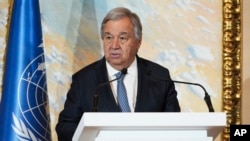A two-day United Nations-led conference on the way forward in Afghanistan started in Qatar’s capital Doha, Sunday, without the Taliban, the de facto rulers, in attendance.
U.N. Secretary-General Antonio Guterres convened the meeting of special envoys for Afghanistan from 25 countries as well as Afghan civil society members, including women, and representatives of the Organization of Islamic Cooperation, the European Union, and the Shanghai Cooperation Organization.
Participants will explore how to engage with the Afghan Taliban in a coordinated manner in light of an independent assessment of Afghanistan mandated by the U.N. Security Council last year.
The Taliban were also invited to Doha for meetings, however, the group refused to attend.
“We had some conditions, that we should have full participation in all sessions, that were not met, so we didn’t participate,” Suhail Shaheen, the head of the Taliban’s political office in Doha, said in a message to media via the text messaging application WhatsApp.
In an official statement issued on social media platform X, the night before the conference kicked off, the Afghan Ministry of Foreign Affairs said that without the U.N. recognizing the Taliban as the only official representative of Afghanistan, attending the conference was “unbeneficial.”
“The Ministry of Foreign Affairs has clarified to the U.N. that if the Islamic Emirate is to participate as the sole official representative of Afghanistan… then participation would be beneficial. Else, ineffectual participation by the Emirate due to non-progress in this area was deemed unbeneficial,” the ministry said.
The Taliban use the term Islamic Emirate of Afghanistan or IEA for their administration.
A source told VOA some participants were disappointed the U.N. could not bring the Taliban to the table.
A delegate who wished to remain anonymous, as he was not authorized to speak publicly on the topic, said that despite the Taliban’s absence, the conference was significant as it showed that the international community was refocusing on Afghanistan while the wars in Ukraine and Gaza were occupying global attention.
Responding to a VOA question on the sidelines of the event, Pakistan’s charge d’affaires in Afghanistan, Ubaid-ur-Rehman Nizamani, said the conference was relevant even without the Taliban.
“I think it [the conference] is about Afghanistan, not about Taliban,” Nizamani said.
Pakistan’s delegation led by Asif Durrani, the country’s special representative for Afghanistan, separately met with Shaheen and his team in Doha.
Afghan affairs observer and journalist Sami Yousafzai told VOA in Doha that the Taliban wasted an opportunity by not showing up.
“I think the Taliban made a mistake [by not attending], and this will increase the gap between Taliban and the international community…the international community recognizes that the Taliban are a reality and wants to speak to them as that, but their absence, I think, hurts the Afghan people as well,” Yousafzai said.
Since taking over, the Taliban have barred girls from getting an education beyond the sixth grade, forbid women from going to universities and working in most professions, limited their movement outside without a male family member, and barred them from parks and public baths. The Taliban have acknowledged that female police officers are arresting women for not covering themselves appropriately.
In a throwback to its first stint in power, from 1996 to 2001, the ultra-conservative group also resumed public floggings in parts of the country.
The Taliban argue such actions are permitted by Islam, and local culture but critics reject their defense as a misinterpretation of the religion and culture of Afghanistan. The de facto rulers reject international calls for reform as unilateral demands and coercion.
Some warn that attempts to increase global engagement with the group will further embolden its hardline stance.
“It will not be a good idea to move forward with more engagement with Taliban because the nature of Taliban and their behavior shows in the past 30 months that they are getting worse towards women and men,” former Afghan diplomat Shukria Barakzai said.
A prominent former Afghan female politician and Kabul’s ambassador to Norway, Barakzai spoke to VOA on the phone from the United Kingdom, where she fled a week after the Taliban took control of her homeland in August 2021.
While no country has recognized the Taliban government, many routinely engage with its leaders. The international community has acknowledged the Taliban’s success in reducing violence in the country and diminishing the drug trade. However, demands to form an inclusive government, and soften its stance on women’s rights — prerequisites for recognition — have not borne results.
In the lead up to the Doha huddle, Amnesty International, in a statement, called on participants to stop taking a “business as usual” approach regarding human rights in Afghanistan.
“The culture of impunity that enables the Taliban’s ongoing grave human rights violations needs to be addressed urgently,” the statement said, quoting Senior Director Deprose Muchena.
Foreign ministers of a dozen countries taking part in the Munich Security Conference 2024, an annual high-level discussion forum, also issued a statement Sunday expressing concern over the severe curbs on women’s freedoms in Afghanistan. It linked recognition of the Taliban government with improved human rights.
“Adherence to Afghanistan’s international obligations by the de facto authorities, especially pertaining to human rights, remains one of the central prerequisites for the reintegration of the State of Afghanistan into the international system,” the statement concluded.




